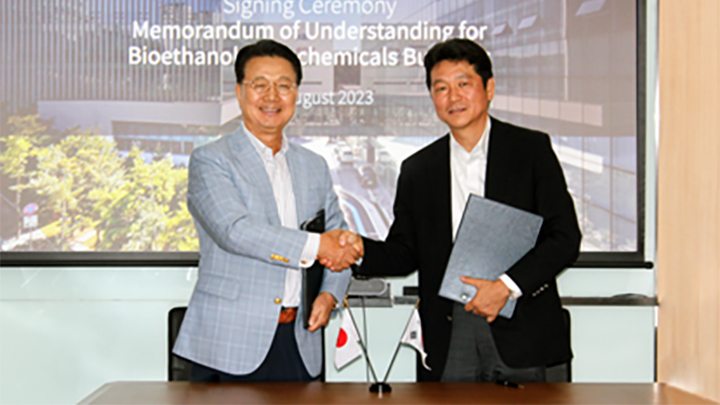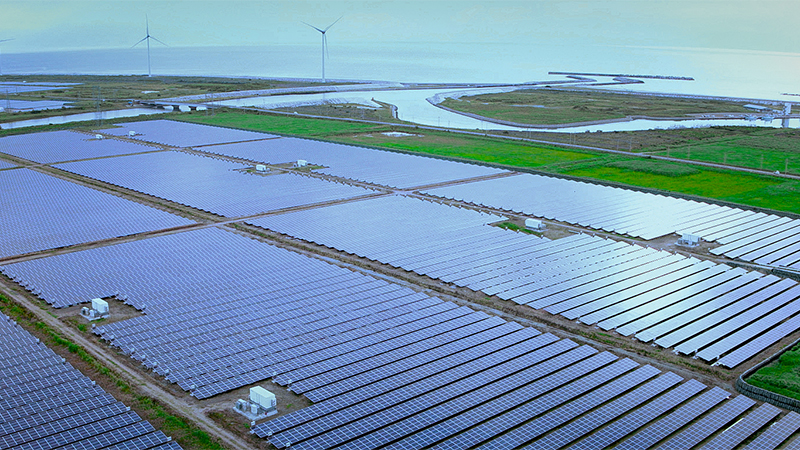Oct. 03, 2023
Memorandum of understanding concluded with Korea Alcohol Group to step up bioethanol imports to JapanCollaboration aimed at establishing circular economies in the green chemical and green fuel sectors
Sumitomo Corporation has signed a memorandum of understanding with KC&A, a Korean chemical/alcohol manufacturing and trading company affiliated with the Korea Alcohol Group, on developing the Japanese market for bioethanol. The two companies will jointly work to expand the applications, and ensure stable supplies, of bioethanol in Japan as a biomass-derived raw material for plastics and fuels that is seeing rapidly growing demand amid efforts to achieve a decarbonized society.

Bioethanol is produced and consumed mainly in the US and Brazil, where about 120 million KL is used primarily for gasoline blending, but recently it has been attracting attention in countries around the world striving to achieve carbon-neutral societies as a renewable energy source and as a raw material for environmentally friendly chemicals such as bio-based plastics and green fuels such as SAF(*1). The market size is expected to reach approximately US$130 billion by 2030, growing at a CAGR of 6.26% during the forecast period (2022-2030).
KC&A is the largest bioethanol trader in Asia. The US and Brazil currently account for about 80% of the world's bioethanol production, but KC&A has 40 tanks in Ulsan, Korea, with a total capacity of approximately 110,000 KL, supplying US and Brazilian bioethanol to the automotive fuel industry and to beverage and industrial markets in Asian countries.
Sumitomo Corporation is working on various projects to decarbonize the chemicals industry, principally through the Green Chemical Business Development Department it established in April 2023. It has positioned bioethanol as the cornerstone of greening and is focusing on expanding bioethanol applications and restructuring its supply chains. In its collaboration with KC&A, Sumitomo Corporation will perform all needed marketing functions and will develop new applications for bio-based plastics as a substitute for petroleum-based plastics as well as eco-friendly alternative energy sources such as SAF. In addition to jointly securing suppliers of low-CI (Carbon Intensity)(*2) bioethanol, Sumitomo Corporation and KC&A are considering jointly investing in storage tanks and other such infrastructure to meet the expected doubling of domestic demand for bioethanol by 2030 driven by new demand. As already announced, the Sumitomo Corporation Group is also pursuing initiatives in support of the commercial production of second-generation ethanol(*3), and the Group through this latest collaboration will simultaneously promote wider use of first-generation ethanol(*4), thereby providing the chemical industry with a broader range of options for achieving carbon neutrality.
In undertaking sustainability management to grow sustainably with society, Sumitomo Corporation has identified six key social issues to be addressed, one of which is "circular economy.” This entails helping bring about a resource-recycling society by shifting to recycling and resource-saving technologies and products, and by working on the sustainable procurement of natural resources. With regard to the chemical materials that support all industries, Sumitomo Corporation will achieve growth in harmony with the global environment by building supply chains that contribute to a circular economy.
Click here for more information about the "Sumitomo Corporation Group's Key Social Issues"- SAF: Sustainable Aviation Fuel; an aviation fuel that emits significantly less CO2 than conventional fuels throughout its life cycle, from production and collection of feedstocks to manufacturing and combustion of the fuel, and that can be used with existing infrastructure without modification
- CI(Carbon Intensity):the volume of CO2 emissions relative to the amount of energy used throughout the bioethanol life cycle (production, transportation, and consumption)
- Second-generation ethanol:ethanol made from non-edible biomass that does not compete with food
- First-generation ethanol:bioethanol produced from edible parts of biomass such as sugar, starch and vegetable oil



